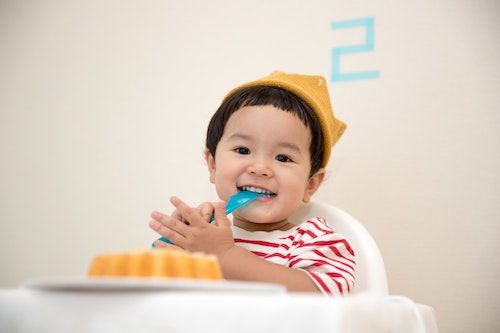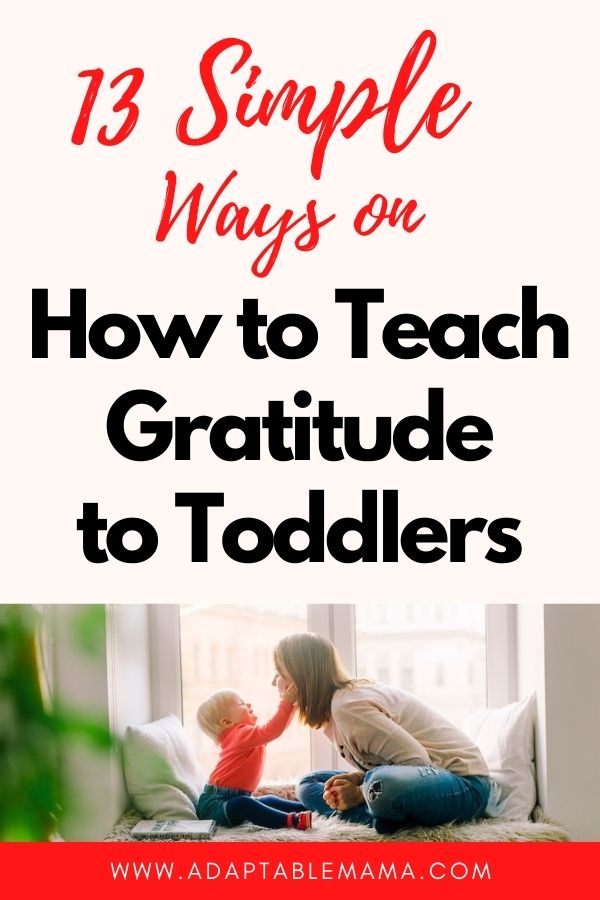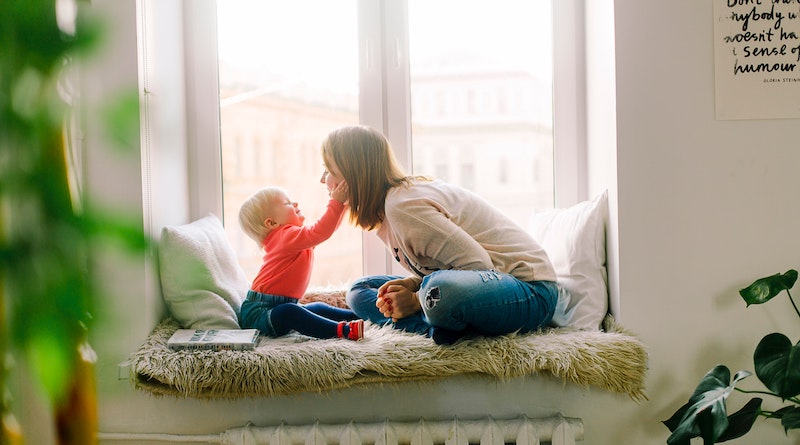Do you want your kids to do well in school and grow up to be kind, resilient, and have high self-esteem? I certainly do. And I found out that being grateful or the art of practicing gratitude, can enhance all of those traits in children and more. But how to teach gratitude to toddlers you might ask?
Practicing it ourselves is already hard enough but to teach it to a young kid who can barely spell their own name will be extremely challenging. I think it’s possible, even if you have little ones, like me (as of this writing, my daughter is 3 years old), with some consistent work and practice. But first..
List of Contents
What is Gratitude?
According to dictionary.com, gratitude is the quality of being grateful or being thankful.
If I’m going to explain that to my 3 year old, I would say that gratitude is that feeling you get when someone did something nice or said something to you. That feeling is mostly a mix of being thankful, happiness, peace and kindness.
Why Is It Important to Learn Gratitude
There’s a dozen studies out there that shows the powers and benefits of gratitude and here’s a few of them:
Gratitude improves your physical health
A study conducted in collaboration with the University of California, San Diego (UCSD) and the University of Sterling, Scotland, found out that those that practiced gratitude had improved heart rates, reducing their risk for heart attacks.
Another study published in 2012 also reported that grateful people are less prone to body aches, pains and ailments. They also are more mindful of their health and more likely to practice self-care, exercise more, etc.
Grateful people are also reported to sleep better and longer, especially when they practice gratitude using a journal.
Gratitude improves your mental health
It’s a no-brainer but if you need further proof, there are several studies led by Emmons where they found out that people who practice gratitude are happier and more optimistic. It blocks out negative emotions of envy, resentment and regret.
Which makes sense, since I don’t think you can feel grateful about your life while feeling envious/ resentful/ regretful at the same time.
So in a way, gratitude also improves your self-esteem. You’re less likely to compare yourself to others. Grateful people are more secure with themselves, and are less likely to buy material goods just to make themselves look and feel good.
Being grateful also makes you more resilient. It also helps you respond better to stress and failure. Even those who experienced severe traumas can adapt and cope with it by being grateful.
Just click here to read more, it’s really quite fascinating how we can all benefit so much by just being grateful.
According to a study by psychologist Alex Wood in the Journal of Research Personality, grateful people are also less likely to succumb to stress or depression.
Gratitude improves your relationships
Those who practice gratitude are considered to be more trustworthy, kind and emotionally stable, making them better friends and desirable romantic partners. It also inspires the people around them to perform acts of kindness and to “pass it on.’
Importance of Gratitude in Children
A new research on gratitude found out that grateful children tend to:
- perform better academically
- are more engaged in hobbies and extracurricular activities
- less likely to use drugs or take part in risky activities
- cope well with stress
- less likely to be depressed
- less prone to jealousy
- are less materialistic
In short, grateful children tend to be happier, confident and more resilient in school.
Aside from hoping my kid grows up happy and successful, I also hope that she’d cope better with schooling, given how competitive and highly stressful the educational system is here in Singapore.
That’s why I think it’s so important to instill the value of gratitude, even at a very young age.
Why Teach A Kid Gratitude As Early As Possible
There’s already a lot of studies of how important the early years of a child’s life is. Those early years can build a foundation for how your kids will think, learn, behave – how they will be for most of their adult lives.
That’s why most parents here in Singapore, (where the quality of education is so superior), take advantage of those early years by giving their kids lots of enrichment classes but I digress.
My 3 year old’s brain now is literally like a sponge, soaking up and absorbing information faster than I expected.
She’s learning at this accelerated rate and I want to take advantage of that by enforcing and cementing certain attitudes and mindsets (like being grateful), that will benefit her for the rest of her life.

How To Teach Gratitude To Toddlers
Understand the 4 parts of gratitude
I didn’t know this at first but I’m so glad I saw this article. Apparently, gratitude has four parts and I quote:
What we NOTICE in our lives for which we can be grateful
How we THINK about why we have been given those things
How we FEEL about the things we have been given
What we DO to express appreciation in turn
– Greater good magazine –
Here are some examples to better understand those parts, which also came from the same link:
NOTICE: What have you been given or what do you already have in your life for which you are grateful? Are there gifts behind the material gifts for which you are grateful, like someone thinking about you or caring about you enough to give you the gift?
THINK: Why do you think you received this gift? Do you think you owe the giver something in return? Do you think you earned the gift because of something you did yourself? Do you think the gift was something the giver had to give you? If you answered no to these questions, then you may be more likely to be grateful.
FEEL: Does it make you feel happy to get this gift? What does that feel like inside? What about the gift makes you feel happy? These questions help the child connect their positive feelings to the gifts that they receive in their lives.
DO: Is there a way you want to show how you feel about this gift? Does the feeling you have about this gift make you want to share that feeling by giving something to someone else? Prompting children after experiences of gratitude in order to motivate acts of gratitude, whether they be acts of appreciation or paying it forward, may help children connect their experiences and actions in the world.
I think most of us learn the NOTICE, THINK and DO part, but not really the FEEL part and that is something I will work on. I want my kid to connect gratitude to positive emotions and to learn that early on.
Since she’s a toddler, I will use simpler, common words like “happy, excited” to describe what she’s feeling when she’s being grateful.
Teach your child to say “thank you”
It might seem forced but it’s the first step in the process. It’s kinda like teaching them the alphabet – repetition is the key.
Eventually, they’ll get the hang of when and why they’re saying thank you. Which hopefully, will move to a more complex understanding of how gratitude works.
Model a grateful behaviour
My child learns best from mimicking and copying so I’m extra careful of what I do and say in front of her.
She almost learned to say the “shit” word but I digress.
So what I do is I try to speak, act and feel grateful, especially when she’s around.
When a neighbour helps in pressing the lift button, I say thank you. When my kid helps me wipe the table, I say thank you. When my husband finally cleans the litter box, I let him know (out loud, within earshot of my daughter), how much I appreciate him for cleaning it.
So model the behaviour. Say thank you, show kindness and as much as possible, reign in the complaints, don’t share it with your little one.
Point out the simplest pleasures in life
For example, if we have beautiful weather today, I’ll say it out loud. I’ll also say how much I like and enjoy it. That it makes me feel happy that we have cool and breezy weather today.
Even for the most mundane things, like when the cats rub themselves on my leg, I let my daughter know how I find it really cute and how much I like it when they do that and how thankful I am for having our cats.
I want her to realize that the simplest things in life can already bring so much joy and satisfaction in our lives.
I may overreact sometimes but most, if not all of the time, I just tend to blurt out things like that and hopefully, my kid will eventually understand the concept.
Always look for the silver lining
It’s something that I’ve been practicing much more recently and it’s something that I want my kid to really learn and apply in the long run.
That way, whenever things get too tough, she’d have that mentality to always look for the positive side of life.
I show this to her through simple actions and words. For example, when it’s raining and we can’t go out to the playground, I will validate her disappointment over not going out, empathize with her and offer a silver lining – at least we get to play more hide and seek inside the house!
I believe it’s a great attitude to have, especially if you’re prone to negative thinking. I should know, I used to be that way.
The key is being aware that you’re thinking toxic thoughts, shift that and look for the positive side of things.
Appreciate and compliment your child
Whenever my kid helps, when she listens, when she does something good, etc., I always take notice of it, point it out and tell her how I appreciate her for doing that.
I also compliment her specifically and not just thank her for doing it.
For example, when she helps out by putting her dishes on the kitchen counter or when she wipes the table after spilling her juice, I tell her “thank you for helping me out with–” and “You’re such a great helper!”
I noticed when I do that more often, she tends to help out more. She gets this giddiness and glow about her, like she’s so pleased with herself for helping me out. Which I really love.
Practice asking what they’re thankful for before going to sleep
A few months after my little one turned 3, I started this habit before bedtime where we’ll take turns and share what we’re thankful for, for that day, before going to sleep.
Her answers are so amusing and so touching. It always leads to an interesting and insightful conversation, making me feel closer to my daughter.
Try it with your kid. You can start it off, so your kid will follow along and will eventually get the flow.
These nightly talks with my kid are just one of the best times I will always treasure, especially when she gets older.
Ask them what they like/ love
I sometimes ask these kinds of questions to my kid, like what kind of toy she likes and why she likes it. Then if she’s responsive, I’ll keep the conversation going on from there.
For me, when you practice that kind of thinking, it makes one more appreciative of what we currently have.
It’s a much more simpler and direct way of asking them what they’re thankful for.
Don’t give in to their demands
I don’t want my kid to feel entitled and disrespectful of other people. I don’t want her to grow up and still get a tantrum whenever she doesn’t get her way.
So I don’t give in to her demands. I do it by managing her expectations. If I know we’re just passing by a toy store, I tell her that we are only going to walk there and we’re not going to buy a toy because it’s not time to buy a toy.
When she asks me to play with her when I’m in the middle of a chore, I show her what I’m doing, I let her know that I’m doing this and it will take me some time to finish it and that I’ll just play with her after I’m done.
Most of the time, she’s very easy-going and patient with this arrangement. At certain times, she will cry, demand, even have a tantrum, but I just do one or two ways from this article, to keep the peace.
Let them help with chores
Lately, my 3 year old is on a helpful streak. And dear old me, is taking advantage.
She has been wiping tables, putting back drinking bottles and bowls on the kitchen counter, cleaning up messes, which is quite amazing.
And I noticed when I let her help and I thank her afterwards, she has this inner glow, like she’s so pleased with herself, for helping me!
So I encourage more of it, even if sometimes, it’s actually easier if I just clean up myself.
I want her to recognize that emotion – how good it feels to help someone, how happy, proud and satisfied one can be, by just making someone else’s day. So she’ll keep doing it and hopefully, that will have a positive ripple effect in her environment and community, when she grows up.
Help them give to others
We were decluttering her toys just recently and she readily helped out to sort the items that she’s okay to give away.
I don’t exactly remember how I managed to make that happen and I don’t know if I have mentioned that some kids don’t have toys and they might be feeling sad but nevertheless, I’m just glad that at this early stage, she’s showing empathy and generosity.
Watch Cocomelon’s “Thank You Song”
Cocomelon is one of those shows where I don’t feel guilty when my kid watches it for 1-2 hour straight. She learns tons from that show!
If you don’t have it in Netflix, you can easily watch it on youtube, particularly that “Thank You Song” and just let the lyrics of that song seep in the consciousness of your child.
Watch, enjoy and explain the video to them, if necessary.
Read books/ listen to podcasts on gratitude
We frequently tune in to this podcast to listen to some stories and there are some that catch my kid’s attention every now and then. Like the “Giving Tree.”
It’s probably one of the saddest stories I’ve ever heard and I don’t know if she really understands how exceptionally generous the tree is, to a fault, but I’m also planning to get her books on gratitude and thankfulness.
Takeaway
I believe that the key to happiness lies in two things – managing one’s expectations and being grateful.
If more people are taught about this mentality and virtue, I truly believe we will have a better, peaceful, happier world. How to teach gratitude to toddlers and other essential virtues can possibly produce that ideal environment where everyone is happy and thriving.
And I want that for my child, especially in these unprecedented times. If ever a worse case scenario happens in my kid’s lifetime, I want her to cope with it better, to look for the silver lining and to always feel thankful in her life.
Do you think it’s too young for toddlers to learn gratitude? What do you think? Let me know by commenting below.

If you enjoyed this post, please consider sharing it on Facebook or Twitter or pin it on your Pinterest, thank you! 🙂

